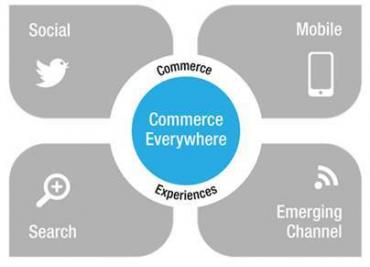Catalyst Fund to launch $4.3 million Inclusive Digital Commerce Accelerator
Catalyst Fund to launch $4.3 million Inclusive Digital Commerce Accelerator. It would be launched in partnership with Mastercard Foundation and MEST.

Catalyst Fund is set to launch $4.3 million Inclusive Digital Commerce Accelerator (IDCA). The new accelerator would be launched in partnership with Mastercard Foundation and the Meltwater Entrepreneurial School of Technology (MEST).
The IDCA is aimed at scaling digital commerce companies in Ghana to support the digitization of micro and small enterprises (MSEs) in the country. It is expected to improve the livelihoods and financial resilience of Ghanaian MSEs, especially those hard hit by COVID-19.
The Catalyst Fund Inclusive Digital Commerce Accelerator will be officially launched on November 4, 2020 (register to attend the virtual event). Some of the people that would be speak at the virtual event include Alex Bram of Hubtel, Lexi Novitske of Acuity Venture Partners, Albert Biga of Zoobashop, Kweku Fleming of MEST Scale, and Jane del Ser of BFA Global.
During the launch event, the Investor Advisory Committee (IAC) of Catalyst Fund will select six digital commerce and innovative companies that can enable informal MSEs to reap the benefits of digital commerce.
The IAC members include Anthemis, Quona Capital, 500 Capital, 500 Startups, Flourish Ventures, Accion Venture Lab and Gray Ghost Ventures. According to Catalyst Fund, the IDCA is a two-year programme.
The Inclusive Digital Commerce Accelerator is the first expansion of Catalyst Fund from its flagship inclusive fintech accelerator, which aims to advance financial inclusion for the underserved population. Catalyst Fund was launched in 2016 and it is managed by BFA Global, a 14-year-old consulting firm that provides research, advisory and data analytics services.
Earlier in June 2020 when it announced its seventh cohort of six startups, Catalyst Fund said: "We are focusing more on businesses building solutions that go beyond financial access and inclusion. We are focusing on solutions that improve the overall financial health of underserved consumers".
According to Catalyst Fund, the IDCA would leverage its extant model and the expertise and deep market knowledge of its country partner MEST — a 12-year-old Pan-African entrepreneurial training programme, seed fund, tech incubator and hub.
The selected startups in the Inclusive Digital Commerce Accelerator would receive:
- flexible grant capital of up to $120,000 each;
- deep, bespoke, expert-led venture acceleration support;
- portfolio meet-ups and curated cohort-based workshop sessions with local expertise and operational support by MEST;
- a commitment to sharing best practices, toolkits, learnings, and insights with the digital commerce sector;
- connections with Catalyst Fund’s growing global Circle of Investors (65+) and Circle of Corporate Innovators; and
- ecosystem acceleration to create a more enabling investment and business environment in which digital commerce companies can prosper.
It is pertinent to note the difference between digital commerce and e-commerce. E-commerce is online selling. According to Gartner — a research and advisory firm, digital commerce is "the buying and selling of goods and services using the Internet, mobile networks, and commerce infrastructure".
> Digital commerce includes the marketing activities that support these transactions, including people, processes, and technologies to execute the offering of development content, analytics, promotion, pricing, customer acquisition and retention, and customer experience at all touchpoints throughout the customer buying journey.
In the statement released on Monday, Catalyst Fund said it will be building an open database of digital commerce companies in Ghana. Companies who wish to express interest in being considered for the inclusive digital commerce accelerator may also choose to be included in the database. Interested companies should complete this expression of interest form.
"We're thrilled to announce the first Catalyst Fund expansion programme, which builds on lessons learned on supporting inclusive fintech companies in emerging markets over the last five years", said Maelis Carraro, Managing Director of Catalyst Fund.
"Through the Inclusive Digital Commerce Accelerator, we aim to impact informal MSEs in Ghana who, particularly in light of the COVID-19 crisis, lack access to a financial safety net and find their livelihoods impacted when physical commerce suffers".
Greg Coussa, MEST Strategic Director, said: "The opportunity to partner with an experienced organization like Catalyst Fund with support from the Mastercard Foundation, is in equal parts exciting and aligned with MEST’s scale strategy in Ghana, and beyond".
He added: "Historically, MEST has focused on early-stage startup support and creation through our training program, seed fund, and incubator programmes. The Inclusive Digital Commerce Accelerator provides an opportunity to work with Catalyst Fund to support scale-stage ventures which are strategically seeking to better reach and serve informal MSEs, leveraging our local knowledge, networks, and expertise".
According to a survey conducted by BFA Global and Ghana Statistical Service (GSS), MSEs are suffering as a result of the pandemic. The survey of low- and middle-income individuals surveyed by BFA Global revealed that 44% of self-employed people had lost their job or could not find work. Similarly, the GSS survey revealed that micro-enterprises reported decreased sales of about 60.9% compared to last April.
"Micro and small enterprises are the bedrock of Ghana’s economy. They are also the most impacted by COVID-19, putting livelihoods and economic gains made over the years at risk", the Regional Head for Western, Central and Northern Africa at Mastercard Foundation, Nathalie Akon Gabala, said.
"Accelerating access to markets through digitization and e-commerce platforms provides MSEs the opportunity not only to scale, but to strengthen their resilience at the other side of the pandemic".






